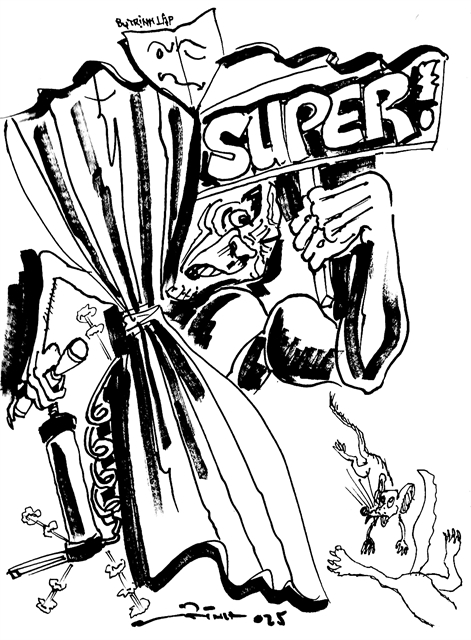 Talk Around Town
Talk Around Town

by Dũng Nguyễn
On social media, everyone loves a good drama, especially really silly ones that come from people who just had to lie to make themselves look better.
Vietnamese on the social media Threads have over the past few days been discussing a case of a famous person making a post about how they were accepted into “Harvard”, which many understandably thought was the highly prestigious Harvard University in the United States.
Praise and congratulations were showered on them, until it was later found out that they were actually accepted to Harvard Extension School, which offers online and offline formats suitable for busy adult workers.
 |
| Illlustration by Trịnh Lập |
Now, enrollment into Harvard Extension School and not Harvard University itself is absolutely nothing to be ashamed of. The former offers high quality education, and you have to meet both the financial and capability requirements to be accepted to the school. A perfectly excellent choice for anyone who wants to further their education.
But that’s not what many people on online social media are talking about.
This person’s post has been a subject of discussion by many people, wondering why did they not just tell everyone that they got into Harvard Extension School, as opposed to leading people to think of the more prestigious and challenging Harvard University.
An online post that was meant to showcase one’s capability and serve as an inspiration to encourage people to pursue higher education has instead turned into a topic of ridicule and laughter.
Now, I myself enjoy a good chuckle whenever some online personality does something really silly and gets called out. No one got hurt, it’s not offensive to anyone, and a few months or even weeks from now most will have forgotten it.
But at the back of my mind, I kept thinking: Why do this?
If they had just said they got into Harvard Extension School, everything would have been fine. People would still be congratulating them, just like what some people have been doing right now even after the truth came out.
Trần Gia Linh, a friend of mine who is much more well-versed in Gen Z culture on social media than me, tells me that there are many other small stories on Threads and other social media platforms about young people lying or exaggerating about their very impressive and totally real achievements, as well as people complaining about them.
These include a person who said they began working as an intern for the United Nations, but in actuality they only visited the United Nations headquarters on a tour, or another person who filmed themselves picking up trash just for online engagement without actually doing much work.
There are also plenty of “humble brag” posts where a person asks for career and educational advice while just nonchalantly mentioning how they are making dozens of millions of đồng per month or own expensive cars.
All cases like these are puzzling to me, but after a round of giggling and eye-rolling, I think I somewhat understand them.
Many psychology papers around the world have tried to figure out why people like to brag on social media, highlighting reasons such as making oneself feel better, increasing one's self-esteem, helping one make business connections more easily, selling products through personal branding, or just a simple dopamine hit.
Many Vietnamese also have this traditional habit of sharing and comparing personal achievements. Mothers comparing their children’s grades with the neighbours’ kids, adults comparing their salaries and houses to one another, the list goes on and on.
Countless Vietnamese, including me, have gotten self-conscious looking at – and being compared to – other people who are richer, more successful, and attractive than themselves.
Social media platforms and how easy they make it to share information do not help either. With over 72 million Vietnamese social media users, anyone can share to the world how rich and cool they are, what kind of achievements they managed to reach which the rest of us could only dream of, what a happy family unit they are, etc.
This understandably leads to more and more people feeling the need to boast about their own achievements - and in cases where they are not as impressive as they think - lie about their achievements.
And why wouldn’t they? There are both emotional and sometimes monetary rewards for making people think you are awesome, and again, it’s not like anyone is getting seriously hurt from this.
However, my wife thinks otherwise. She says that all of these online posts about amazing accomplishments from young people are making other young people feel worse about themselves.
“Many people are trying their hardest and yet cannot make their dreams come true, and all of these lying posts are making them feel terrible for no good reason,” she says.
There is also a trend of online personalities amassing a large number of followers thanks to an image of success, then promoting products of low quality or unclear origins, she points out.
The issue of people needing to prove themselves and be seen as impressive has been a long-standing issue with no clear answer. This above-mentioned case is not the first, and definitely won’t be the last.
Personally, I think it is very important to cultivate a sense of self-worth in oneself, not through fancy achievements and expensive objects, but through the little things in life, the small things you do, the people you love and care for, etc.
Everyone has their strengths and weaknesses, and appreciating the things happening in your life right now and just trying to be a better version of yourself, without comparing yourself to any other person, is a lesson I learned from my parents and others around me, something that helps me feel just a bit less sad when my friends talk about how much money they are making.
Linh points out that partaking in meaningful charity activities can also be a boost to one’s self-value as you are doing something good for people in need. There are ways to prove yourself without indirectly making others feel bad.
But if anyone still thinks that they just have to lie about themselves on the internet, I guess it’s not that big of an issue. After all, we can always use a quick laugh whenever a person’s silly lie blows up right back at their faces and they have to scamper to an explanation. — VNS




